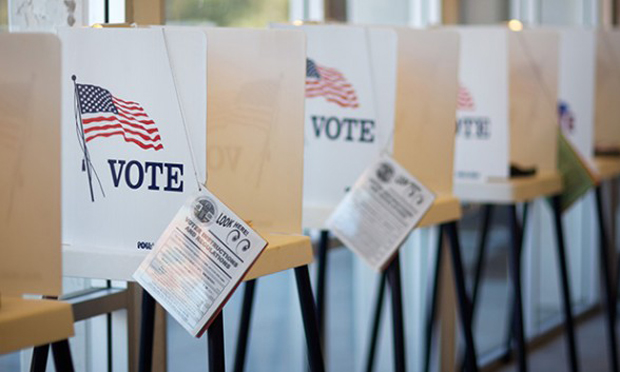From the Scholars Strategy Network, written by Sarah Elizabeth Gollust of the University of Minnesota School of Public Health. This piece has been edited for Journalist’s Resource.
If there is one thing political scientists know about elections, it is that voting is not equally distributed across society. Young people, poor people, and people with just a high school diploma are less likely to vote than older people, wealthier people, and college graduates. We also know that people suffering poor health are less likely to vote.
But what about people who have chronic illnesses like cancer, heart disease, or arthritis? Are people dealing with those long-term health problems more or less likely to vote than other citizens?
New research findings
In research done collaboratively with Wendy Rahn, I examined voting rates in the 2008 election for people who have one of five common chronic health problems — cancer, heart disease, diabetes, asthma, and arthritis. We used data from eight states where the U.S. Centers for Disease Control and Prevention conducted surveys in 2009. Statistical controls allowed us to pinpoint the effects of chronic illnesses, while taking into account many social and economic factors that are known to influence both voting rates and health, such as age, socioeconomic status, and residence in urban versus rural areas.
Our results show that specific chronic health problems are associated with different voting rates.
- People with cancer are almost three percentage points more likely to vote than otherwise similar people who do not have cancer.
- In contrast, people with heart disease are about 1.5 percentage points less likely to vote than similar people who do not suffer from heart problems.
- These differences in voting held even after we took into account whether respondents said they were disabled, enjoyed emotional support, felt sick or well, did or did not have health insurance, and indicated they had ever avoided seeing a doctor because of the expense.
The impact of support groups and organized advocates
Why are people with cancer more likely to vote? Civic groups for people dealing with cancer may help to explain this finding. Across the United States, there are many well-established support groups and advocacy groups representing people with cancer, but similar groups are less prevalent for people with other chronic health problems. The prevalence of cancer support and advocacy groups may give cancer patients and survivors more social resources, social networks, and supports compared to people coping with heart disease.
Civic supports appear to make the biggest difference for the least advantaged patients and survivors. Our findings became especially intriguing when we looked separately at groups who tend to experience a higher burden of illness in society – namely, blacks compared to whites, and people with high school degrees or lower levels of educational attainment, compared to those with higher levels of attainment.
- Remarkably, we found that blacks and people with lower levels of educational attainment who have received a cancer diagnosis vote at rates almost four percentage points higher than would be expected given their social characteristics.
- This extra turnout boost was even greater than the boost we found for whites and better educated people with cancer.
Why health status matters in U.S. politics
The 2008 election was seven years ago, but it was a turning point election for health policy and politics, with reverberations that continue to this day. Health reform was a major voting issue in 2008, when the election of Barack Obama and Democratic Congressional majorities opened the door to the enactment of the Affordable Care Act in March 2010. Implementation of this comprehensive reform law has, in turn, brought a significant expansion in health insurance coverage across the United States. Our research found that people who lacked health insurance in 2009 were 4.5 percentage points less likely to report voting in the 2008 election than those who did have health insurance coverage. We also found that people who reported being sick were more than 5.5 percentage points less likely to vote than people who said they were in excellent health. Our specific findings about higher voting rates for cancer sufferers versus people coping with other chronic health problems need to be understood in that larger context.
Our study identifies correlations, not evidence that these health-related factors cause people to vote more or less. Yet these findings offer some implications for the future. Over the past few years as the Affordable Care Act has been implemented, the percentage of Americans without health insurance has dropped to record lows.
- It remains to be seen whether the expansion of health insurance coverage to millions more people might shift voter turnout in 2016, as our evidence from the 2008 election would suggest.
- The people who have gained new health insurance coverage under the Affordable Care Act are concentrated in the approximately 30 states that have chosen to expand Medicaid, predominantly Democratic-leaning states and swing states. Yet, new health insurance enrollees are younger and less affluent, characteristics which traditionally predict lower voter turnout.
The voting differences we document for various groups of chronic disease sufferers may not matter as much in national elections as gaps by health insurance, health status, or socioeconomic status. Nevertheless, the example of cancer patients and the families and clinicians who care for them suggests that better organized chronic disease sufferers can be more civically engaged and have a considerable impact on Election Day.
Related research: Sarah E. Gollust and Wendy Rahn, “The Bodies Politic: Chronic Health Conditions and Voter Turnout in the 2008 Election,” Journal of Health Politics, Policy, and Law (forthcoming).
The authors are members of the Scholars Strategy Network, where this post originally appeared.
Keywords: voting patterns, chronic disease, voting bloc, voter turnout, election turnout


Expert Commentary